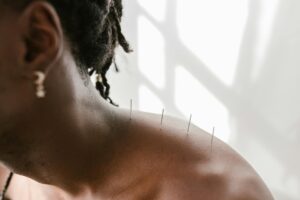Top 10 Benefits Of Acupuncture Explained

Patients nowadays are taking a more complete survey of their condition. They’re making more of an attempt to work with traditional, or alternative healers (alongside their certified Western MD’s) in order to receive the best care possible. And one of those sources for healing is acupuncture. Long respected for its ability to heal illnesses that traditional medicine often cannot, acupuncture has become a staple of medicine worldwide – and when learning about its top benefits, it is no surprise as to why.
Acupuncture Explained

Acupuncture can solve a myriad of health problems.
Traditional Chinese medicine doctors mapped out the human body according to its pathways (aka meridians) and channels of energy which course through us, and which keep us in balance. There are hundreds of points all over the body, and each point (or group of points) corresponds to an organ, physical process, or collection of nerves, muscles, and blood vessels. When affected, they can produce changes in our systems of immunity, digestion, breathing, nerves, and so on.
By inserting needles into different points and depths along the body, an acupuncturist seeks to stimulate the nerves, circulate the blood, provide symptomatic relief, and bring healing to certain regions of the body. In the tradition of Chinese medicine, the body’s organs don’t always require specific and direct intervention. Many times, emphasis is put on taking care of other areas and/or organs – ones which are linked to the source of the issue.
Top 10 Benefits Of Acupuncture
1. High Blood Pressure
Hypertension is one of the truly silent killers. It can sneak up on you day by day. High blood pressure can be related to many conditions, and there are usually no prior symptoms. Nothing which would indicate something was going wrong with the circulatory system.
In order to treat high blood pressure effectively, it’s best to establish the root cause. This is true with any condition, really. What is its nature? How did it start? Is it purely physical or perhaps stress-induced? What if it’s some sort of organ malfunction/failure? Is it diet- and lifestyle-related?
A study conducted in 2015 reexamined the value of acupuncture in the hypertension setting. The results were not of a high enough quality to turn the tables on the whole thing. But researchers did manage to establish a stronger link between acupuncture and lowering blood pressure.
2. Headaches, Migraines
If you have a headache that won’t quit, get yourself to a doctor. Once properly diagnosed, the doc may recommend acupuncture in conjunction with pain medication, depending on the situation. Some parts of the migraine remain a mystery, and there is no single cause for its onset. These sometimes-brutal attacks – which often take the shape of a pulsing pain in one of the sides of the head – can potentially last many hours and sometimes even several days.
Acupuncture’s mission is to restore balance, but not all headaches are the same. There is a difference between a chronic case of migraines which stems back to childhood and a series of incessant headaches which develop as the result of, say, a car accident.
3. PMS, Menopause

Hormone imbalances can affect women of all ages.
When your hormones are out of whack, when your very life source – your blood – is going through changes — then you may need to get things back into balance using acupuncture. It’s not the only method of doing that, of course, but it has merit.
Some women get hit hard when Aunt Flo comes for her monthly visits. Who would have thought that staying fertile would be this much of a pain in the…Well, it hurts (so I hear), so let’s just leave it at that. But acupuncture may offer some relief by stimulating the release of endorphins. These play a large role in the way which the body regulates itself. If you manage to get your hormones in check, the accompanying symptoms can be somewhat reduced.
With menopause, the body goes through something which can be described as less predictable than PMS. While menstruation can take a heavy toll, it often occurs in a regular or semi-regular cycle. Therefore, it can be anticipated to some degree. With menopause, you usually don’t have the “luxury” of regularity or previous familiarity with the symptoms. This adds to the physical and emotional turmoil.
4. Depression
And speaking of hormones, depression is a condition closely associated with hormonal imbalance. Our moods, sleep cycles, level of immunity, appetite, sex drive, and more – these are regulated by hormones which are busy running marathons all over our body, constantly relaying messages.
If there is something blocking a pathway (or several of them), this can cause a kind of buildup. It can bring on various symptoms and can also manifest as a significant reduction in the amount of overall joy and happiness. Acupuncture aims to remove the blockage and allow the proper flow of chi throughout the body.
Much like symptoms and conditions which seem purely physical, the treatments for depression, anxiety, stress, and other maladies of the mind should be followed closely by a physician. At times a person might need a psychologist or psychiatrist.
Women are categorically at a higher risk of acquiring depression. This is largely due to the ever-present hormone shifts and physical changes, which in themselves are a part of any healthy woman’s life (menstruation, pregnancy, childbirth, menopause). This physical and emotional roller coaster is indeed natural, but sometimes it can disrupt a person’s day-to-day life. Either way, remember that you don’t have to suffer in silence; get some help if you need it.
5. Back And Joint Pain

Acupuncture can help treat back and joint pain so that you can continue to be active.
One of the strongest bonds in the human body is that of the spine and brain. As a continuation of the brain stem, the spine is a serious link in the human chain of consciousness and sentience. It’s an integral part of the nervous system.
The joints – part of our bone-connecting mechanisms – will often act up due to some form of inflammation or injury. Once diagnosed, your doctor may prescribe medication and probably recommend physical therapy. Sometimes they will recommend acupuncture for back and joint pain.
The spine and joints are vital links in that great physical chain. They are important connectors. As such, infection or injury can cause anything from mild pain and irritation to total incapacitation of the individual. Acupuncture seeks to treat pain caused by inflammation and infection. It aims to reduce the swelling and limitation in mobility which is often associated with such conditions.
6. Indigestion
In traditional Chinese teachings, the stomach is sometimes referred to as the Sea of Chi – a place where there is a never-ending flow of different energies. There is where in-depth filtration and separation of foodstuff takes place. It’s the home of good and bad gut bacteria, acids, as well as surpluses and deficiencies. Therefore, it’s a zone where balance must be kept, because it’s a sensitive area which can provide health and wellness, but which can also act as the starting point of many diseases and ailments.
Indigestion is an umbrella term for many conditions relating to the stomach: pain, bloating, gassiness, heartburn, reflux, bowel churning, nausea and vomiting, fatigue (particularly after meals), and general discomfort in the stomach area.
Acupuncture has the potential to help those suffering from indigestion. By re-opening blocked channels of energy in and around the gut, and by treating the organs related to the stomach, patients can find relief and improve the function of their digestive system. This is not a magic cure by any means, but it can help get things under control.
7. Arthritis

Acupuncture can help with arthritis by stimulating the release of cortisol.
I mentioned joints and joint pains earlier. But since arthritis is a whole disorder on its own (and is very common), it deserves its own section. There is no cure for arthritis. But there are different techniques and pharmaceutical drugs you can use to reduce symptoms like pain, swelling, stiffness, and general discomfort.
Determining the root cause of arthritis can prove to be difficult, because there are many factors involved. Genetics are a big part of arthritis, as is lifestyle. Depending on the type of arthritis and its severity, the patient may seek acupuncture as a supplemental form of treatment.
Stimulating the release of cortisol is one of acupuncture’s main “selling points” in this case. The arthritic pain is often brought on by inflammation. Which is why increasing the presence of the inflammation-reducing hormone cortisol in the body can help with the treatment of accompanying symptoms.
8. Muscle Cramps, Pain
If there is one thing in this world which we don’t want any more of, it’s pain. To quote George Orwell in his masterpiece Nineteen Eighty-Four: “Of pain you could only wish for one thing: that it should stop.”
Those of us who are in pain, no matter the cause, will be looking for a solution. If not a solution to the root cause of the pain, then at the very least we will be searching for a way to reduce the pain. Those with chronic pain are regularly in a state of agony, and it is difficult to conduct oneself under those conditions. Pain – or the avoidance of it – can become the focus of one’s life, not by choice but simply because it cannot be ignored.
Muscle cramps, twitches, and spasms can be a source of great pain and discomfort. Our muscles seem to turn on us all of a sudden. They become hyperactive and then we find ourselves in utter misery, trying to contend with muscles that are not being their usual selves.
Reducing pain and loosening cramps can be achieved with the Chi manipulation which acupuncture offers. When blood is being carried to the right areas, and when the energy is flowing properly through the body, the nerves can relax and the muscles can revert back to their ordinary behavior.
9. Blood Flow

Acupuncture is a good way to try to increase blood flow in the body.
Blood is the liquid essence of life. It is the purveyor of oxygen, nutrients, and all good things to our cells. Places/organs which receive their appropriate share of blood go on living and thriving. When the body is injured or is otherwise under attack, the body may send for the cavalry – the blood cells, both red and white.
The pathways of the blood are many, but their root is one – the heart. Our aortic pump, as it were, circulates our oxygenated blood throughout the body. It makes sure that it gets everywhere it needs to be. Acupuncture stimulates the body’s own mechanisms of healing, and it has the potential to significantly increase the flow of blood to a certain area.
In the past, bloodletting was used to regulate and oversee the flow of blood. People thought that bloodletting (with the use of proper tools or leeches) would be able to restore balance. There is some logic to it, but it isn’t that popular these days. Nowadays, many agree that even if the practice is beneficial in certain cases, it is a method of treatment which is obsolete. Acupuncture is still a viable option for regulating and improving blood flow.
10. Insomnia
The mind/body connection is a vast topic, but sleep is part of how we connect to it. The body rests, the mind wakes up, and consciousness shifts to sleep mode. When we are sleeping there are parts of the body which become wide awake. A tad ironic, albeit not unexpected.
Acupuncture can help to induce sleep. Remember, this is a lot about releasing the right kinds of hormones, and it can reduce the amount of disruptions which occur during sleep. So, how does it get all of this done? Well, first of all there is the idea of putting the body at ease. When the body is relaxed and calm, there is a greater chance of sleeping the whole night through.
One of the main goals of insomnia-related acupuncture is increasing the production of melatonin, one of the hormones that regulates our sleep cycles. This helps to establish healthier sleep/wakefulness patterns.
11. Bonus Benefit – Unexpected R&R!
Many patients agree that acupuncture can induce a state of relaxation. It’s not unheard of for patients to fall asleep on an acupuncturist’s table during the treatment. Depending on your type of insurance or medical agreement, you could technically be snoozing on the company dime! So enjoy the R&R!
Conclusion
You can’t ignore the fact that acupuncture remains a deserved staple of medicine. It’s an ancient method of treatment which has managed to stay in the picture long after many other practices have become nonexistent. Energy is always in motion, and our body reacts to these motions and seeks homeostasis – balance and harmony which facilitate good health. Use your chi wisely, direct it properly, and you will be able to endure (and possibly overcome!) all manners of physical, mental, and spiritual hurdles. It works at Acupuncture Jerusalem!


